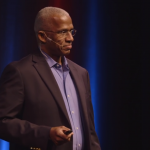Companies spend millions of dollars and significant time defining meaningful mission statements. But rarely do they execute the harder work of ensuring that their base of employees are energized and activated by this statement of purpose. To truly engage an enterprise in an inspiring mission, start with the people themselves. That’s why it’s important to get the right mix of ingredients in each employee and team — so that engagement is built into the DNA of the enterprise.
I define these traits as: work ethic, heart, optimism, and maturity — or WHOM for short.
This principle of hiring originated in Jim Collins’ book “Good to Great.” The bestseller deals with a detailed study of companies that significantly outperformed the S&P 500 and a direct peer comparator group over a 40-year period. Collins explains that the companies who achieved great results employed a principle of “First Who, Then What” — getting the right people on the bus before deciding on the destination of the bus. Since Collins’ book did not offer clear guidance on exactly how to define the right who, I decided to innovate my own approach.
Initially, this concept was something I tried to ascertain via the traditional interview process of having several key people investigate a candidate’s experience by focusing on their resume. I found that we got it wrong as often as we got it right in terms of hiring people with the desired attributes. I began identifying a series of behavioral interview questions and creating a template that would dramatically improve my success rate. After leveraging this resource for all my hires over several years, the number of bad hires was significantly reduced, while the speed to achieving alignment and agreement on goals and desired outcomes has greatly increased.
Now let’s dig deeper into the four traits every team member needs:
Work ethic: Teams must be able to get things done, which is why I value work ethic so much. Nothing else matters if progress is not made at pace. Sourcing for work ethic is a function of asking the right behavioral interview questions, and as well as interrogating how someone gets things done and what they define as progress. For me, work ethic is a far more valuable trait than mere intellect.
Heart: Don’t underestimate the importance of passion in terms of achieving an organization’s mission. A group of people who share a commitment to make a difference are a powerful force. I try to ascertain what drives and motivates each person who enters my organization: the more driven and passionate they are, the faster we move and make change happen. There is nothing like working side by side with people who have similar passions and motivations.
Optimism: Barriers, issues, and problems will regularly arise and hamper progress. Having people “on the bus” who naturally seek solutions rather than simply identify issues will keep the organization overcoming challenges, and heading towards achievement. Imagine the power of a group of people who will not let obstacles stop them from moving forward.
Maturity: One of the realities of dealing with high achievers is that disappointments and interpersonal conflicts will naturally arise. Before I hire someone, I investigate someone’s self-awareness and find out their history of overcoming interpersonal conflicts. This is one of the most important attributes for senior leaders if you don’t want to have a “Game of Thrones”-style leadership team. Everyone feels it when senior leaders are not aligned and don’t like working together.
A team comprised of individuals with the right WHOM will coalesce faster around goals, bond together more naturally, keep obstacles out of the way of progress, and not get derailed by interpersonal conflicts. Imagine the power of an organization made of this raw material. I can attest from personal experience that when you source work ethic, heart, optimism and maturity in your people, the sky is literally the limit.
I’ll leave you with these questions: What attributes do you value most in your teammates and staff, and why? To what degree is your team currently made up of these most desirable attributes? If the answer is below your expectation, what adjustments can you make to ensure the right behavioral expectations are reinforced and aligned? Answering these questions will help you define the traits you most value and the process to precisely source them.





